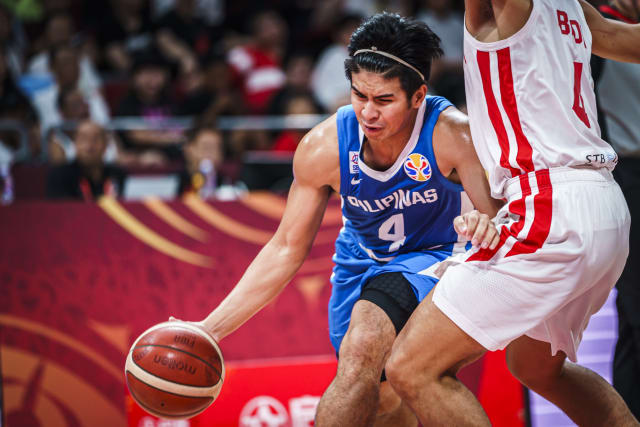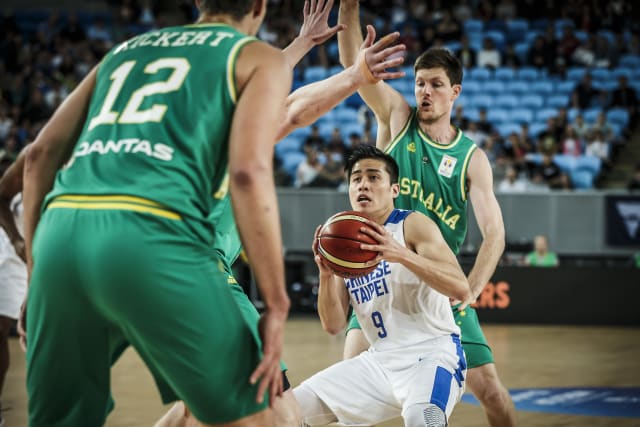Top league draft picks loads up deep U16 Asian Championship class of 2009
KUALA LUMPUR (Malaysia) - The FIBA U16 Asian Championship 2009 featured top draft picks from the CBA, PBA, and KBL as well as other superstars of today. Who was your favorite?
KUALA LUMPUR (Malaysia) - It’s been just over a decade since the first ever FIBA U16 Asian Championship 2009 which was held in Kuala Lumpur. Looking back at that historic competition, many of the players that flashed potential superstardom eventually developed into exactly that - a superstar.
Guo-lden Standard
There was just no stopping the China national team here on their way to the title. The young dragons started the competition with an 80-point win over Saudi Arabia and just kept steam-rolling along. They ended up sweeping through the competition for 8 consecutive wins with an average margin of victory of 56.0 points per game.
The standout star of the team was none other than Guo Ailun, who led the team in scoring and was the second leading scorer in the tournament. His highest scoring total in this competition was an explosive 34 points, which was also tied for most scored among all players as well.
Fast forward to present time, Guo is the face of the backcourt for the national team. He played in a FIBA Basketball World Cup back in 2010 even before he made his FIBA Asia Cup debut in 2013. At the senior national team level, he already has experience in two Olympics games, two FIBA Basketball World Cups, and three Asia Cups. Aside from being an Asia Cup champion in 2015, he’s also won a title in the China Basketball Association (CBA) with the Liaoning Flying Leopards.

Guo’s flashy handles and acrobatic finishes have made him a fan favorite, not only in China, but among fans all over Asia.
China had a well-rounded championship squad that year which also featured two other players who would continue to step up and become bigger names at the senior national team level: Zhai Xiaochuan and Ding Yanyuhang.
While Ding was limited for most part of this competition, Zhai was a force at the forward position. Zhai put up 13.3 points per game throughout the tournament and, more impressively, stepped up his game in the later stages. From the quarterfinals up until the championship game, Zhai averaged 18.3 points per contest. In the title game in particular, Zhai recorded a monster double-double of 20 points and 17 rebounds.
Both Zhai and Ding are currently key parts of the China national team and were featured on the recent World Cup 2019 squad. Ding is a former CBA MVP and both are stars on their respective clubs in the domestic league.
Lee-ding the way for Korea
Korea and China have always had intense battles at the senior national team level, so there’s no surprise that it also trickled down to the youth level. Korea struggled a bit more on their way to the title game, specifically in the Semi-Finals against Iran.
In a back-and-forth battle that went down to the wire, Korea were able squeeze an 82-81 victory despite trailing for most of the game. A big factor of that win was the play of big man Lee Jonghyun who put up a sturdy double-double of 19 points and 10 rebounds.
Korea featured a well-balanced line up that had five double-digit scorers and Lee was one of them with an average of 11.8 points per game.
From there, Lee has continued to step up as one of Korea’s best young big men. He made an impressive Asia Cup debut at 19-years-old in 2013 averaging 7.1 points and 4.8 rebounds per game. In total, Lee has played in three Asia Cups and one more World Cup. Barring any injuries, Lee has always been a key part of each Korea national team.

Lee is just as important in club play, where he was the number one pick in the Korean Basketball League (KBL) draft back in 2016 to Hyundai Mobis Phoebus. He won his first KBL title in the 2018-2019 season.
Riding the Rise of the Seniors
Iran’s rise to power in Asia started in 2007 and the youth national team programs displayed that that rise was not only limited to the senior level. They were merely one point away from making it to the Final, losing in heartbreaking fashion to Korea in the Semi-Finals. Iran ended up with a third-place finish after an overtime win over the Philippines.
There were many talented players on that Iran national team, but it’s been Sajjad Mashayekhi who has made the biggest leap in the next stage. Mashayekhi wasn’t a premier scorer on this U16 squad at only 6.4 points per game, but he’s now already played in two Asia Cups. Most recently in 2017, Mashayekhi scored 12.8 points per game for the silver medalists.

Kief it Up
Kiefer Ravena is currently one of the biggest up-and-coming stars of Philippines basketball right now. Anyone who watched Ravena at the U16 Asian Championship 2009 would have probably seen this coming.
Right from the start, Ravena scored 25 points against Japan en route to a 64-59 win. He continued his impressive scoring run to finish with 17.6 points per game, good for 6th among all players.
Ravena has since been a regular on the senior national team from appearances in the World Cup Qualifiers, World Cup 2019, and the first window of the FIBA Asia Cup 2021 Qualifiers. He was also the second pick in the Philippines Basketball Association (PBA) draft, going to the NLEX Road Warriors.

Though Ravena has yet to make his Asia Cup debut, it’s almost certain he will in the near future with the Philippines transitioning to their next wave of talents.
Ray of Hope
The U16 Asian Championship class of 2009 was heavy in guard talent. From Guo, Mashayekhi , Ravena, and Chen Ying-Chun, this was a batch of guards that could one day go down as one of the best.
Chen Ying-Chun (or Ray Chen) was easily Chinese Taipei’s biggest star during this tournament, where they finished with a 5-3 record. He finished among the top 10 in scoring, which was good enough to also lead the team as well.
The 1.81M (5’11”) guard went on to play in the NCAA Division II before returning to play in Asia as the number one pick of the Chinese Basketball Association (CBA) draft in 2017. Chen has already stepped up as one of the best players currently on Chinese Taipei’s squad, as attested by his performances during the World Cup 2019 Qualifiers and Asia Cup 2021 Qualifiers.

Chinese Taipei are trying to transition into a new generation and it’s clear that Chen will be leading the way into the new frontier.
Terrific Trio
Jordan might have finished only at 8th place in the U16 Asian Championship, but the senior national team has eventually benefitted from the experience gained by three players from this event.
Malek Kanann led Jordan in scoring with 16 points per game in this competition, before making his Asia Cup debut in 2015.
On the other hand, while Ahmad Al Dwairi didn’t score much in 2009, he was the first of the U16 squad to crack into the senior national team rotation. The big man made his Asia Cup debut in 2013, averaging 3.1 points and 2.4 rebounds per game. Al Dwairi was also on Jordan’s recent World Cup 2019 team as well.
Another player who was on this U16 squad and played in the World Cup was Yousef Abuwazaneh. The burly center was a solid contributor back in 2009 and continues to do so with the senior national team, most recently during the first window of the Asia Cup 2021 Qualifiers.

Alexandr the Great
It is not an understatement to say that the U16 Asian Championship class of 2009 is deep in talent. Kazakhstan, who finished at 9th place, were led by Alexandr Zhigulin who shined with 15.0 points per game.
It’s worth noting that Zhigulin had already played in the U18 Asian Championship and U19 Basketball World Cup a year earlier. Now at the age of 26, Zhigulin has already played in 3 Asia Cups. The sharpshooting big man also has a signature game on his belt in the 30-point outburst to upset the Philippines in Manila during the World Cup 2019 Qualifiers.

Before the Bhamara Breakout
We’ve already highlighted Satnam Singh Bhamara’s breakout FIBA U16 Asian Championship performance which was in 2011. However, that was even his first time playing in the competition.
Satnam’s U16 Asian Championship debut was less spectacular than that of his play in 2011, averaging only 1.5 point per game. However, what would you expect from someone playing against top talents who are mostly a year or two older than him?
(Go check out Satnam’s performance at the 2011 edition of this competition as well as other stand out from this class here.)
Dare-Delvin
Delvin Goh was among one of the younger players at the competition, having just turned 14 several months earlier. That didn’t matter as he was already a key force for Singapore as he would continue to do so for the next decade.
Goh averaged 9.1 points per game in Malaysia, including a 17-point outing against Thailand. He’d later make his Asia Cup debut in 2015 where he was one of only three players to average double-digits in rebounds at the age of just 20. He was one of Singapore’s most important pieces during their run at the FIBA Asia Cup 2021 Pre-Qualifiers and should be even better when the next opportunity comes around for him to represent the country.

Let's hear it! Who is your favorite player from the FIBA U16 Asian Championship 2009?
Quiz Maker - powered by Riddle
FIBA